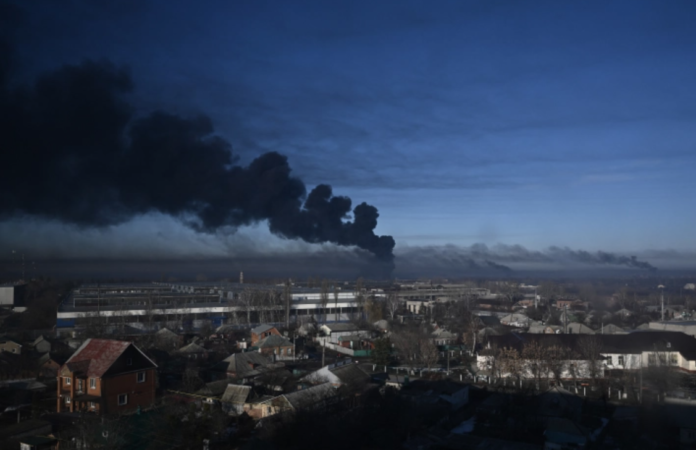Russia has launched an all-out invasion of Ukraine by land, air and sea, the biggest attack by one state against another in Europe since World War Two and confirmation of the worst fears of the West.
The attacks began on Thursday after Russian President Vladimir Putin said in a televised address that he had approved a “special military operation”. The move came after Moscow earlier recognised rebel-held territories in Luhansk and Donetsk and said they had asked for its “help”.
Russian missiles rained down on Ukrainian cities on Thursday. Ukraine reported columns of troops pouring across its borders into the eastern Chernihiv, Kharkiv and Luhansk regions, and landing by sea at the cities of Odessa and Mariupol in the south.
Russian troops attacked Ukraine from Belarus as well as Russia with Belarusian support, and an attack was also being launched from annexed Crimea, Ukraine’s border guard service said.
Explosions could be heard before dawn in the Ukrainian capital Kyiv. Gunfire rattled out near the main airport and sirens blared across the city.
Ukrainian President Volodymyr Zelenskyy said that martial law had been declared and he appealed to world leaders to impose all possible sanctions on Russia, including on Putin, who he said wanted to destroy the Ukrainian state.
Ukraine’s Foreign Minister Dmytro Kuleba wrote on Twitter that Putin had “launched a full-scale invasion of Ukraine”.
“Peaceful Ukrainian cities are under strikes. This is a war of aggression. Ukraine will defend itself and will win. The world can and must stop Putin. The time to act is now,” he said.
Putin justified the attack as “a special military operation” to protect people, including Russian citizens who had been subjected to “genocide” in Ukraine, an accusation the West has long described as absurd propaganda.
“And for this we will strive for the demilitarisation and denazification of Ukraine,” Putin said. “Russia cannot feel safe, develop, and exist with a constant threat emanating from the territory of modern Ukraine.”
Russia’s defence ministry said it had taken out military infrastructure at Ukrainian airbases and degraded its air defences.
Ukraine closed its airspace to civilian flights citing a high risk to safety, while Russia suspended domestic flights at airports near its border with Ukraine until March 2.
Russian-backed separatists in the east said they had captured two towns, the RIA news agency reported.
Shortly after Putin spoke, Al Jazeera’s Andrew Simmons, who is in Kyiv, said there were explosions in the capital and power had been cut.
It appeared to be a “full-scale attack”, targeting the airport and key buildings, he said. There was “chaos” in the city centre, he added.
US President Joe Biden, in a phone call with Zelenskyy, condemned the “unprovoked and unjustified attack by Russian military forces”, the White House said.
Biden said in a statement he briefed Zelenskyy on Washington’s and its allies’ planned next steps against Russia, including “severe sanctions”.
In an impassioned appeal, UN chief Antonio Guterres condemned Russia’s actions.
“In the name of humanity, bring your troops back to Russia,” he said. “In the name of humanity, do not allow a war to start in Europe which could be the worst war since the beginning of the century with consequences not only devastating for Ukraine, not only tragic for the Russian Federation but with an impact we cannot even foresee.”
NATO called an emergency meeting with chief Jens Stoltenberg condemning what he said was a “reckless attack”.
The European Union’s foreign policy chief Josep Borrell said Russia faces “unprecedented isolation” over its attack on Ukraine and will be hit with the “harshest sanctions” the EU has ever imposed.
‘You declared war’
Putin’s address ordering the military action took place at the same time as the United Nations Security Council met for its second emergency meeting this week.
Russia’s UN ambassador Vasily Nebenzya, who is the current president of the Security Council, admitted to fellow members of the council that “special operations” were under way, insisting to the other ambassadors that the action did not amount to war and was a consequence of Ukraine’s actions.
“The aim of the operation is to protect the people who for eight years have been suffering “genocide” of the Ukrainian regime,” he said, claiming the action was justified under Article 51 of the UN Charter (the article allows for individual or collective self-defence in the face of an armed attack on a UN member state).
Putin demanded Ukrainian forces lay down their arms, and repeated his position that any Ukrainian membership of NATO was unacceptable to Moscow, according to state media.
In the UN council chamber, Ukraine’s UN Ambassador Sergiy Kyslytsya appeared lost for words: “Three minutes ago, your president declared war on my country,” he said to Nebenzya.
In a second round of comments, having effectively called for Russia’s expulsion from the UN, he concluded: “There’s no purgatory for war criminals, Mr Ambassador, they go to hell”.
The US said it was calling for an urgent resolution at the Security Council, and the call was backed by the United Kingdom, France and Ireland who noted Russia’s utter “disdain” for the United Nations by its military assault. The meeting is expected within 24 hours.
As news of the assault on Ukraine filtered through, some diplomats condemned Russia.
Germany said it was a “shameless breach of international law” while the UK said the attack was “unprovoked, unjust” and it was a “dark day for Ukraine”.
Analysts said it could be that Russia was beginning with a “shock and awe” attack in the belief that it might mean it could get what it wants without having to mount a larger scale attack.
“Putin might think that will cause such shock that the government will collapse, that there will be calls for surrender,” William Courtney, an expert at the Rand Corporation in Washington, DC, told Al Jazeera. “If so, the Kremlin has probably underestimated the resilience of Ukrainians.”

































